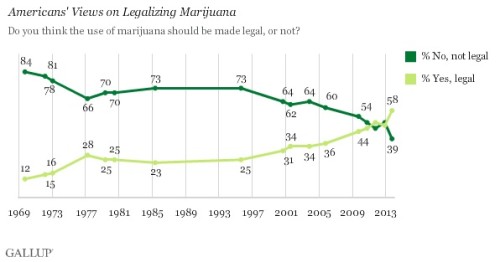So I ended up in a twitter exchange with Peter Hitchens…
It started with a note from Evert Rauwendaal…
@TransformDrugs @DrugWarRant Oh dear. Peter Hitchens in Australia to talk about the morality of drug taking http://t.co/7zg52v0UcA
Peter Hitchens noticed and chimed it.
@EvertRauwendaal @TransformDrugs @DrugWarRant Why’Oh dear’ ? Worried about the open expression of dissenting views , are we?
I tried to answer his question.
.@ClarkeMicah @EvertRauwendaal @TransformDrugs It’s not the expression of moral opinion, but the desire to impose the same on everyone else.
Hitchens replied, attempting to turn the tables…
@DrugWarRant Exactly.The imposition of your selfish moral opinion would endanger the health of millions, to suit a selfish few.
Up is down. Freedom is slavery. Tyranny is liberty.
So to Hitchens, it is free choice (legalization) that is the imposition of a moral opinion on the world. Once you believe that, then you believe that people as a whole are incapable of free choice and must be dealt with like livestock, with some self-appointed farmer (or guardian of morals) to care for them.
You see this delusion in people who have strong convictions that not only are their particular moral views the only correct choice, but that it’s acceptable to use power and violence to make others also “moral.”
Of course, that’s nonsense. Power and violence don’t make morality. They just make power and violence. (And it’s typical that they are uninterested in, or unwilling to believe, any information that shows either the failure of power and violence to achieve the stated moral goals, or the damage from that power and violence.)
There’s always someone with a moral opinion that they want to impose on others. There have been a ton of them out there, between people like Hitchens and the huge variety of religious prohibitions, such as
- No eating pork
- No dancing
- No playing pool
- No working on Saturday (or Sunday)
- No drinking alcohol or using certain other drugs
- No showing your face
- No watching movies
- No premarital sex
- No cooking a goat in its mother’s milk
- No tattoos
- No nudity
- No blasphemy
- No wearing clothing made of more than one kind of cloth
- etc., etc., etc.
Although some of these were grounded in practicality (not getting sick from eating undercooked pork), for any them (or any like them) to be enforced by the state for moral reasons (as opposed to scientifically supported public policy) is absurd in any kind of free society.
Which may be why you so often see advocates of legislated morality turning language on its head, like Hitchens with his tweet to me, or those who perversely demand religious freedom when what they’re really calling for is religious tyranny.
It’s startling to me how often these days tyranny against others is being described as a liberty right. In religious circles it turns up all the time as freedom to practice their religion… by imposing state-sponsored prayer on all children, by objecting to the teaching of science in schools that conflicts with their personal religious beliefs, by requiring that all people follow their own prohibition against making images of their religious leader, etc.
I have no problem if your religion requires you to not look at red hair, but that makes it your responsibility to avoid situations where you might see it, not my responsibility to wear a hat. Making me wear a hat in order to allow you the positive right of living in a red-head-free world is a complete bastardization of the notion of liberty.
Similarly, calling for the right to live in a drug-free world as a moral imperative is just as flawed. And this is why Evert Rauwendaal was right to say “Oh dear” at the notion of Peter Hitchens’ approach to drug policy, which is modeled on Professor Harold Hill’s discussions of pool.


